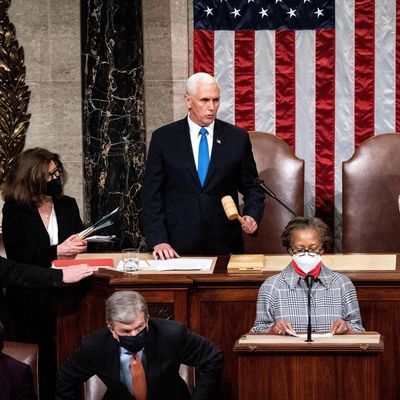
Responsible, patriotic people in both major political parties have been quietly hoping Congress would make time to repair the confusing and outmoded procedures set out in the Electoral Count Act of 1887 that governs the endgame of presidential elections. Ambiguities in that law, after all, allowed for the January 6 chaos in Congress and fed the Trump-incited insurrection that spilled blood and endangered democracy that same day.
So far, bipartisan efforts to devise an ECA fix (likely in the Senate) have failed to bear fruit — perhaps because most congressional Republicans want to avoid Trump’s ire and “move on” from January 6. In any event, House Democrats appear to have decided to force the issue into the open on a more partisan basis, as CNN reports:
Members of the January 6 committee are working on potential legislation to tighten the process of certifying a presidential election in an effort to eliminate contentious avenues that spurred the January 6 riot, sources tell CNN …
Specifically, members are focused on making changes to a 19th Century law known as the Electoral Count Act that was intended to give Congress a process by which to certify the Electoral College votes submitted by the states. It’s a mundane but crucial part of the presidential election machinery, one that Trump and his allies attempted to exploit last year.
Technically, this effort will be bipartisan because of the support of Republican committee member Liz Cheney of Wyoming. But since most House Republicans object to the very existence of the January 6 committee and are infuriated by Cheney’s involvement in it, it is better understood as a partisan initiative to get the ball rolling on an obscure but essential reform that some Senate Republicans and conservative opinion leaders may embrace once it is unavoidably in the public eye. We will hear complaints that Democrats are talking about ECA legislation only in order to show a “legislative purpose” for their subpoenas of Trump’s White House records of activities and communications associated with January 6. But Republican opposition to the legislation has no bearing on that issue, which the courts will adjudicate.
It is unclear exactly what these House members plan in the way of an ECA fix, but presumably it would address three key concerns I laid out back in April:
The key steps needed are (1) to clarify that only state-certified electoral votes may be “counted” in Congress; (2) to make it clear the vice-president’s “announcement” role does not imply the power to choose noncertified over certified electors; and (3) to make electoral vote challenges during the largely ceremonial certification procedure in Congress much harder (i.e., a much higher threshold than support from one House and one Senate member).
Patriotism aside, why might some Republicans (say, enough to overcome a possible Senate filibuster) support such a fix, particularly if it can be disentangled from the January 6 committee? Well, to start with, it’s hard to imagine any of the seven Republican senators who voted to convict Trump of inciting insurrection would resist a measure that could make a similar outrage (by Trump or anyone else) less likely in the future. After all, if there were no practicable way for Congress to overturn a state-certified presidential victory, there would be no point in sending over a mob to force it to do so. The more we understand what was going on in Trump’s camp that fateful day, the more it seems some of his advisers wanted to compel an adjournment of the vote count until they could get some last-minute state-legislative activity under way to decertify Biden electors and create bogus Trump ones. Tighter limits on both the vice-presidential and congressional power to redo electoral votes might keep that from arising in the future. This argument should appeal to Republican senators who voted against Trump’s conviction on the grounds that post-presidential impeachment was unconstitutional but who nonetheless deplored the attempted coup (e.g., a certain very senior senator from Kentucky).
There could be Republican senators who favored a Pence coup on January 6 but now prefer to put restraints on the vice-president sitting in that chair in January 2025: Kamala Harris. Above all, it’s hard to envision a public argument that can be made for refusing to actively consider the simplification and clarification of a 134-year-old statute subject to such conflicting interpretations and abuse. If Republicans don’t like what House Democrats propose in the way of reforms, they should offer their own. But indifference to this travesty is no longer defensible.






























